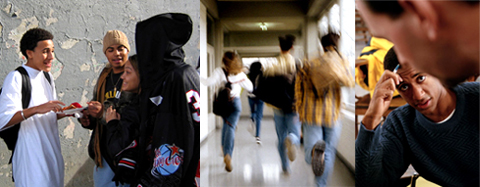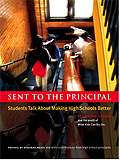|
HEAR US OUT
Last year, WKCD writer Kathleen Cushman spent six months collecting perspectives on school leadership from 65 high school students nationwide. In a new book, Sent to the Principal: Students Talk About Making High Schools Better (Next Generation Press, May 2005), Cushman shares their insights on a range of issues that exert a largely unnoticed effect on how they learn and thrive.
|
|
The students describe small signals that tell them whether their school expects them to succeed. They suggest ways to include their peers in routine decisions adults often make-about security, food, transportation, discipline-which affect their school experience. When they speak of matters that may seem purely practical, they link these back to the crucial issues of relationships between adults and young people. Students speak eloquently of the sense of investment and trust that follows when those relationships are strong and inclusive. "If students knew when they woke up in the morning that what they had to say really mattered in what changes were made in the school-they would really come," says RaShawn, 17, who attends an overcrowded urban high school his district has labeled as failing. "It wouldn't just be an education that processes them, but one that they could affect and shape to benefit the student body." These students also put forth a fresh angle on school improvement: They want adults to regard them as investment partners in their schooling, and treat them accordingly. "The kid is a thread and the school is like a fabric, and you want to weave that kid into the fabric," says Adit, a senior at a large public high school in New York City. "You want to make it so that he has a vested interest in the dynamic of the school, and make him interested in, make him respect, the workings of the school, rather than see it as just another opportunity to show his defiance." Here we present some of what students told us, when asked what school leaders can do to make high schools better, along with a PDF of excerpts from the book. |
|
|
Click below Student advice to school leaders on: knowing us, working things out, keeping us safe, letting us express ourselves, making school interesting, and supporting good teaching. Table of Contents, Introduction, and sample "Homework for Principals" from Sent to the Principal. Download PDF.
Click here to order a copy of Sent to the Principal: Students Talk About Making High Schools Better by Kathleen Cushman and the youth of What Kids Can Do. |

